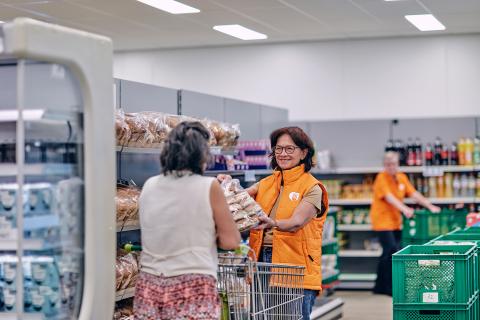Tilburg University and The Foodbank join forces to lower barriers to food aid
Around 180,000 people in our country receive support from the Dutch association for food banks. Although these figures illustrate that many individuals can find their way to food banks, estimates suggest that a far greater number of citizens qualify for such aid. In a collaborative effort, Tilburg University and The Foodbank are working together to lower the barriers to accessing food banks by safeguarding the privacy, dignity, and autonomy of food bank clients.
With the "Clients Under the Radar" project, The Foodbank proactively reaches out to potential food bank clients. The project focuses on providing clear and easily accessible information, aiming to remove obstacles that may prevent people from seeking support, such as shame and prejudice. At Tilburg University, researchers Anuj Puri and Frans Cruijssen are formulating guidelines and ethical safeguards to protect the privacy, dignity and autonomy of potential food bank clients, so that they can trust they will not face disadvantages from seeking food bank support.

Client data analysis contributes to more people receiving support
The analysis of client data can be meaningfully employed to identify and assist individuals and families who are eligible for food bank support, but do not receive support yet. For instance, the analysis of income and unemployment data at the neighborhood or municipal level can help set up local campaigns that lead to more people seeking food assistance. However, there are valid ethical concerns about the use of technological data analysis to encourage people to approach food banks for support.
The research conducted by Anuj Puri and Frans Cruijssen enables The Foodbank to manage client data responsibly and build trust among those seeking access to food banks.
Digital Dignity Initiative
With their research project, called the Digital Dignity Initiative, Puri and Cruijssen first identify how many people may be eligible for food bank assistance in a particular area but are not currently receiving support. This is achieved through the analysis of data from The Foodbank, individual food banks, and publicly available data from CBS, including information about income, poverty, and unemployment. In addition, interviews are conducted with food bank clients and staff, both at The Foodbank and local food banks, to investigate any obstacles and factors preventing people from seeking assistance from a food bank.
Based on the insights arising from this research, ethical guidelines will be provided to The Foodbank to successfully execute the "Under the Radar" project. The findings of the DDI project will also be published in the form of a research report.
-

Dr. Anuj Puri
Tilburg Law SchoolAnuj Puri is a researcher of the Tilburg Institute for Law, Technology, and Society (TILT) at Tilburg Law School. Visit his profile page here.
-

Dr. Frans Cruijssen
Tilburg School of Economics and ManagementFrans Cruijssen is a researcher of the Department of Econometrics and Operations Research at the Tilburg School of Economics and Management. He is part of the Zero Hunger Lab. Visit his profile page here.
More information?
Want to know more about the Digital Dignity Initiative? Visit the website and check out the video below, in which dr. Anuj Puri explains what the research project is about.
The Digital Dignity Initiative is funded by Tilburg University’s Digital Sciences for Society program:
Get ready for the digital future
The Digital Sciences for Society program invests in impactful research, education and collaboration aimed at seizing the opportunities and dealing with the challenges of digitalization for science and society.
